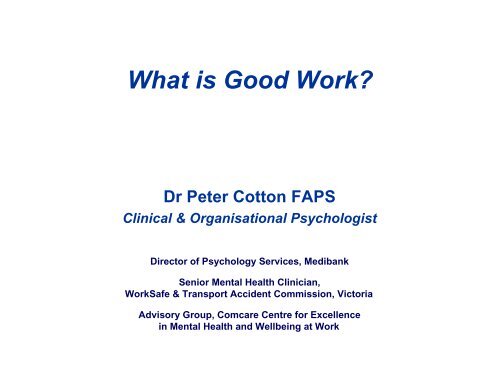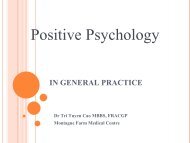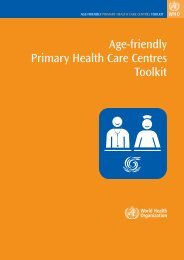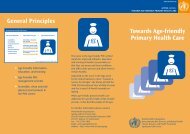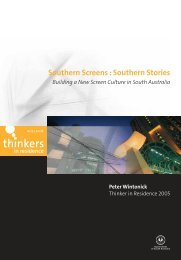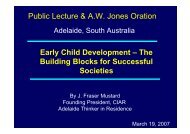What is Good Work?
What is Good Work?
What is Good Work?
You also want an ePaper? Increase the reach of your titles
YUMPU automatically turns print PDFs into web optimized ePapers that Google loves.
<strong>What</strong> <strong>is</strong> <strong>Good</strong> <strong>Work</strong><br />
Dr Peter Cotton FAPS<br />
Clinical & Organ<strong>is</strong>ational Psycholog<strong>is</strong>t<br />
Director of Psychology Services, Medibank<br />
Senior Mental Health Clinician,<br />
<strong>Work</strong>Safe & Transport Accident Comm<strong>is</strong>sion, Victoria<br />
Adv<strong>is</strong>ory Group, Comcare Centre for Excellence<br />
in Mental Health and Wellbeing at <strong>Work</strong>
The Problem of ‘D<strong>is</strong>cretionary Absentee<strong>is</strong>m’<br />
© 2012 Dr Peter Cotton Email: peterc@cottonocp.com.au<br />
• Requests for GP sickness certification have increased by 70<br />
percent over the past nine years in Australia.<br />
• D<strong>is</strong>ability Support Pension <strong>is</strong> currently the fastest growing<br />
welfare benefit in Australia (800,000+ individuals).<br />
• DSP growth <strong>is</strong> predominantly in milder health and mental health<br />
problems (e.g., chronic musculoskeletal pain, anxiety and<br />
depression)
© 2012 Dr Peter Cotton Email: peterc@cottonocp.com.au<br />
“Real<strong>is</strong>ing the Health Benefits of <strong>Work</strong>”<br />
The Australasian Faculty of Occupational and<br />
Environmental Medicine (AFOEM) position statement<br />
presents international and Australasian evidence<br />
that:<br />
– “work <strong>is</strong> generally good for health and wellbeing, and<br />
– that long term work absence, work d<strong>is</strong>ability and<br />
unemployment generally have a negative impact on health<br />
and wellbeing”<br />
– “Medically unnecessary d<strong>is</strong>ability” Chr<strong>is</strong>tian ACOEM (2006)<br />
– “Fit note” Black (2009)
© 2012 Dr Peter Cotton Email: peterc@cottonocp.com.au<br />
The Australasian Consensus Statement on<br />
the Health Benefits of <strong>Work</strong><br />
• Supported by more than 80<br />
signatories including the<br />
Royal Australian College<br />
of GPs<br />
• A call to action to promote<br />
awareness of the health<br />
benefits of work
© 2012 Dr Peter Cotton Email: peterc@cottonocp.com.au<br />
‘Bad <strong>Work</strong>’ <strong>is</strong> not <strong>Good</strong> for Mental Health !<br />
• Study involving 7,155 respondents.<br />
• Overall, unemployed respondents had poorer mental health than<br />
those employed.<br />
• However, the mental health of unemployed individuals was<br />
comparable or better than individuals in bad jobs (i.e., very ‘poor<br />
psychosocial quality’ jobs = low control, high demands and<br />
complexity, job insecurity and unfair pay).<br />
Butterworth, et al (2011)
© 2012 Dr Peter Cotton Email: peterc@cottonocp.com.au<br />
Background<br />
• 10 year Organ<strong>is</strong>ational Health research program<br />
based at the University of Melbourne<br />
• Research team led by Prof Peter Hart<br />
• National Health & Medical Research Council<br />
funding<br />
• Focus on key drivers of staff motivation, wellbeing<br />
and performance outcomes
The Organ<strong>is</strong>ational Health Framework …<br />
Emotionality<br />
+<br />
+<br />
+<br />
Psych<br />
Injury<br />
Emotion<br />
Focused<br />
Coping<br />
+<br />
Problem<br />
Focused<br />
Coping<br />
_<br />
+<br />
+<br />
Org.<br />
Climate<br />
+<br />
_<br />
+<br />
Negative<br />
Experiences<br />
Positive<br />
Experiences<br />
+<br />
+<br />
+<br />
_<br />
+<br />
_<br />
+<br />
_<br />
D<strong>is</strong>tress<br />
Job<br />
Sat<strong>is</strong>faction<br />
_<br />
Morale<br />
Non certified<br />
Sick leave<br />
Turnover<br />
Intentions<br />
D<strong>is</strong>cretionary<br />
Performance<br />
Customer<br />
Experience<br />
+<br />
+<br />
+<br />
Performance<br />
Sociability<br />
Based on Hart & Cooper (2001)
Organ<strong>is</strong>ational Health research<br />
© 2012 Dr Peter Cotton Email: peterc@cottonocp.com.au<br />
Measuring organ<strong>is</strong>ational health indictors across a range of<br />
industry sectors...<br />
Public Sector<br />
Private Sector<br />
Accountants and Econom<strong>is</strong>ts<br />
Community Services <strong>Work</strong>ers<br />
Emergency Services <strong>Work</strong>ers<br />
Hospital Staff<br />
Local Government Employees<br />
Police Officers<br />
Primary & Secondary Teachers<br />
TAFE Employees<br />
Technical/Scientific Staff<br />
Airline Employees<br />
Engineering Employees<br />
Finance Sector Employees<br />
Information Technology Employees<br />
Insurance Employees<br />
Resource Industry Employees<br />
Retail Employees<br />
Telecommunications Employees<br />
Utilities Employees
© 2012 Dr Peter Cotton Email: peterc@cottonocp.com.au<br />
Key Initial Findings<br />
• Reporting of stress in the workplace <strong>is</strong> not<br />
necessarily caused by increased d<strong>is</strong>tress – but can<br />
also be caused by a lack of positive work<br />
experiences and positive emotions<br />
(Cooper & Hart, 2001)
© 2012 Dr Peter Cotton Email: peterc@cottonocp.com.au<br />
An Organ<strong>is</strong>ational Health Model ...<br />
Leadership<br />
Behaviours<br />
<strong>Work</strong> Team<br />
Climate<br />
Employee<br />
Morale<br />
& Motivation<br />
Business<br />
Performance<br />
Staff<br />
Wellbeing
© 2012 Dr Peter Cotton Email: peterc@cottonocp.com.au<br />
The Structure of Occupational Wellbeing<br />
Mental<br />
Health D<strong>is</strong>orders<br />
Job<br />
Sat<strong>is</strong>faction<br />
Resilience<br />
D<strong>is</strong>tress<br />
Morale<br />
Psychological Injury<br />
Flour<strong>is</strong>hing
© 2012 Dr Peter Cotton Email: peterc@cottonocp.com.au<br />
Key Drivers of Staff Motivation and Wellbeing<br />
Appra<strong>is</strong>al & Feedback<br />
Causes<br />
Teamwork<br />
Professional Development<br />
Goal Alignment<br />
Participative Dec<strong>is</strong>ion-Making<br />
Role Clarity<br />
60% of Individual Morale<br />
80% of <strong>Work</strong>group Morale<br />
80% of <strong>Work</strong>group D<strong>is</strong>tress<br />
30% of Individual D<strong>is</strong>tress<br />
Supportive Leadership<br />
<strong>Work</strong> Demands<br />
Explains
The Critical Role of Morale<br />
© 2012 Dr Peter Cotton Email: peterc@cottonocp.com.au<br />
‣ Higher levels of morale increase resilience and buffer<br />
employees against the impact of operational stressors.<br />
‣ Levels of morale are strongly influenced by supportive<br />
leadership and the quality of work team climate.
© 2012 Dr Peter Cotton Email: peterc@cottonocp.com.au<br />
Effective leader behaviours …<br />
Focus on<br />
People<br />
Focus on<br />
Development<br />
Focus on<br />
Core Business<br />
Supportive<br />
Leadership<br />
Manages People<br />
Coaches Staff<br />
Builds Own Skills<br />
Being approachable<br />
Seeks Feedback<br />
Builds<br />
Relationships<br />
Supports Staff<br />
Effectively<br />
Manages Change<br />
Values Training<br />
& Development<br />
Is Entrepreneurial<br />
Creates a Quality<br />
Environment<br />
Provides Direction<br />
Knowing the<br />
problems staff face<br />
Supporting staff<br />
Role modeling<br />
Proactive engagement<br />
Effectively<br />
Manages<br />
Projects
Leadership Styles and Psychosocial R<strong>is</strong>k<br />
© 2012 Dr Peter Cotton Email: peterc@cottonocp.com.au<br />
Lia<strong>is</strong>sez-Faire<br />
Leader as<br />
Technical Adv<strong>is</strong>or<br />
Popular<br />
Leader<br />
Excessively<br />
Directive<br />
Leader<br />
Team Environment:<br />
Team Environment:<br />
Team Environment:<br />
Low support<br />
Low clarity<br />
Low Engagement<br />
Don’t communicate views<br />
about important <strong>is</strong>sues<br />
Neglect Feedback<br />
Fail to follow up on<br />
requests for ass<strong>is</strong>tance<br />
Avoidance of leadership<br />
responsibilities<br />
High Support<br />
Lower Clarity<br />
Focus on positive<br />
interpersonal<br />
relationships<br />
Don’t address<br />
behavioural <strong>is</strong>sues<br />
Neglect performance<br />
management<br />
Avoid tough<br />
conversations<br />
High Clarity<br />
Low Support<br />
Low engagement<br />
Poor communication<br />
Neglect of<br />
Developmental Feedback<br />
Over-emphas<strong>is</strong> on<br />
Corrective Feedback<br />
Perceived Stigma About<br />
Reporting Personal<br />
Problems
Underpinning of <strong>Work</strong> Psychosocial Quality<br />
Empathy<br />
•Trustworthy<br />
•Even-handed<br />
•Understanding<br />
•Proactive<br />
Clarity<br />
•Clear goals<br />
•Micro &<br />
Macro<br />
Objectives<br />
•Delegations<br />
Engagement<br />
•Dec<strong>is</strong>ion-<br />
Making<br />
•Goal Alignment<br />
•Teamwork<br />
Learning<br />
•Feedback<br />
•Coaching<br />
•Development<br />
© 2012 Dr Peter Cotton Email: peterc@cottonocp.com.au
© 2012 Dr Peter Cotton Email: peterc@cottonocp.com.au<br />
Why the psychosocial quality of work <strong>is</strong> so important …<br />
Wellbeing &<br />
Motivation<br />
Loyalty<br />
Behaviours<br />
Retention<br />
Absence<br />
Cost<br />
Customer<br />
Experience<br />
Business<br />
Performance<br />
80% 60% 25% 15% 50%<br />
30%<br />
the leader and cultural behaviours that form the foundations of engagement and performance<br />
Four Pillars of Leader and Cultural Behaviour<br />
Clarity<br />
Empathy<br />
Learning<br />
Engagement


